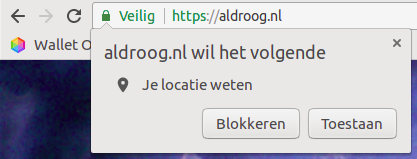Making a case for JavaScript, in-browser Mining
So, today, Brendan Eich spoke up against mining on your browser.
Eich is the founder of Mozilla, Inventor or JavaScript, and current CEO of the ground-breaking browser Brave.
On twitter, he says:
Brave now blocks the abusive-even-when-opt-in (1.75 cores on my MBP which became too hot to call a laptop) 1st party Monero mining script at Salon, thanks to fast work by @lukemulks.
I have several problems with this tweet, and this this new block-them-all feature in the Brave browser and most adblockers. Which I’ll explain below.
First, some background on Brave: Brave has its own cryptocurrency, BAT, which is a payment system that allows you, the user of Brave, to pay a website or publisher. A very nice alternative for ads, so to say.
I love this idea, on a high level: to let me, a user, decide to pay a site that I peruse. I’ve ran Brave ever since they came with this idea and a built-in Bitcoin Wallet, to leverage this same idea (which they now moved to a BAT system).
Now, some background on browser-mining. Quite some cryptocurrencies use a mining algorithm for which making specialised hardware is impossible (currently infeasible, actually). Monero is one of them, the most famous. So, Monero, for example, is mined on “normal” CPU’s. In order to mine more Monero, you need more CPU’s. And because of how the mining works, it can be done in your browser, using a miner that is written in JavaScript: a browser miner. And when I want to “mine more Monero”, where can I “obtain” more CPU? Right: by running that miner on the visitors of a website.
I’ve spent 3 hours writing this article, spent ฿130 on coffee (That is Thai Baht, not Bitcoin) and considerable research on monero and coinhive to get this to you. If you like my work, consider pressing the button below, to run a miner on your computer, and pay me with a few Watts of your electricity. Or to see how it works, without paying me, see the demo on Coinhive.
Note that there’s is a big chance that your adblocker is blocking it, so head over to a standalone page instead, if you wish. Or disable the adblocker, I’m running nothing but my own piwik - pinky promise.
The first problem with Brave’s implementation, is that it is default-on and an all-or-nothing thing. An alternative would be a popup like “Google Maps want’s to access your location. [Allow] [Never]”. You’ve probably seen it. Below is an example from Chrome (in Dutch, sorry):

berk.es wants to
mine Cryptocurrency on your laptop.
[Block] [Allow]
Brave could have gone for this established UI-pattern, but instead they chose to “block it all”. A pity. A missed opportunity.
Imagine the possibilities:
- Donate to Wikipedia by mining a few minutes, instead of dealing with their annoying beggar-popups
- Use Netflix for free, by running a miner on one CPU core when watching series.
- Avoid the privacy-abusive advertising industry by running JavaScript on your computer, rather than tracking users all over the place.
- CAPTCHA’s, DDoS protection, all by running a few seconds of a miner on your laptop.
- Have “outgoing affiliate links” that don’t work in secret behind the
scenes with trackers, cookies and whatnot, but a clear
[Mine and Redirect] or [skip mining]-page URLs. A step-up from a link like this (NOTE: following that link does pay me a few grains of coffee actually, thanks!)
The second problem I have with Brave is the fact that “mining cryptocurrencies to donate to a website” is a direct competitor of their own platform, where you donate to a website by obtaining their own currency and paying with that.
Competition is always good, don’t get me wrong. It’s just that this direct competition gives Brave incentive to block their competitors in their browser. Or to present the competition as “inherently evil” and so on. All under the pretence of “protecting the users”. Which, in some way, they actually do.
I’m not pretending to know the that Brave or Brendan Eich are implementing their “mining blocking” because of this. But I do know that their own incentives are perpendicular to those of incentives like Coinhive. That should make you at least wary of what they say about each other: a competitor will never say about their competition that it is a good alternative.
This could be a reason that the Brave developers chose to not white-list “JavaScript mining initiatives” which try to implement an actual friendly, opt-in system. Or to work together with those that try to be friendly, honest and clear about the mining on a website”.
The third problem I have is how this “block all mining” and the noise around it, drowns out any proper discussion about it. The current stance, fueled by brave and Brendan Eich is that “Browser Mining Equals Evil”. I fear the discussion is closed and an otherwise interesting technology is killed off.
This certainly is the fault of all the “Evil” miners our there, though. They are abusing ad-networks, hacking websites, routers and CDNs, for some free Monero. The overwhelming majority of browser-mining is evil and done without your consent. That is bad. And should be blocked.
But the solution to work towards would be to block the evil ones and work together with companies like Coinhive, to improve the initiatives for honest and friendly-use-cases.
As a sidenote: One of the biggest “threats” for CPU-mined cryptocurrency like Monero, currently, are all these evil players. The miners operating botnets, hacking CDNs to inject Browser miners, stealing AWS credentials, are rewarded much higher, while honest miners, with a laptop (and some cheap solar energy) stand no chance. I would not be surprised to learn that a vast majority of mining power in Monero comes from “stolen” CPU-cycles. But that is a different discussion.
Which brings me to the “energy use of cryptocurrency”-debate. A lot of people dislike all cryptocurrency because it is “uselessly” burning up electricity. A stance that I find just as strange as someone being against neon-ads, or public television screens. All these screens on city-streets, all these huge Coca-Cola signs on top of buildings combined -a wild guess, I could not find any proper figures to back this up- probably use far more energy than Bitcoin or Monero does. And it is just as “useless”.
But even if true: a proper, opt-in, consensual miner on a website allows someone who dislikes this whole crypto-crap to just ignore it. If you don’t like it: don’t participate. If you do see the value in it, think it is not “useless”, then it is a nice way to make a micro-payment to that site.
But, back to that evil network of JavaScript miners: they have messed up an otherwise fantastic opportunity.
You can see this opportunity in action above: a single click of a button and you can pay me for writing this (again, I need to stress this to make the point clear: you can simply also ignore it!)
Clicked it? You just paid me!
You did not need to register with PayPal, or pay fees to a credit card-company. You did not have to buy some token or currency on an exchange. Did not have to install a special browser to donate, there were no wallets to top-up, no copies of ID-cards to send to some server (that will be hacked in some future) because of KYC-money-laundering-regulations. No secret keys to back-up, no wallets that can get hacked, or twelve-words-backup-phrases to securely store away in that safe you still need to buy.
Just a press of a button and you are rewarding my work. And paying for another coffee.
It is privacy-friendly: had I embedded some ads from Bing or Google, they, and hundreds of other data-miners out there would be tracking you, my precious visitor (the only tracking this site has, is my self-ran, self-hosted, privacy-enhanced Piwik analytics). Ads are the really very evil, deceptive and abusive alternative here: they mine your data, sell it, trade with it, and use it to present more ads. Most of the time all this “stealing of your data” happens without your consent and without you knowing: that is why I tend to call them thieves: they steal data from you that you never agreed on giving away.
It is very clear and honest, when opt-in: I’m not running anything on your computer. I’m not selling your data to trackers or ad-networks. I’m offering you a choice to donate to me. Had I ran ads, I would be selling the privacy of you, my visitors, without your consent, to large companies that live of gathering (stealing) and mining that data. Which is far worse. Of all the alternatives, an opt-in JavaScript miner is the most honest one, since it’s abundantly clear what I’m offering. And you are in your full rights to simply ignore my request.
Now, if you don’t feel like clicking that mining-thing above, feel free to “pay” me, by sharing this story, or dropping me a line on @berkes, my twitter feed.

